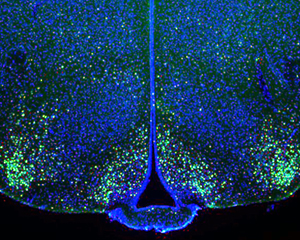Neuroendocrinology and Sex Differences

UCLA is an international leader in research and education in neuroendocrinology and sex differences. Our group studies two sets of factors, sex hormones and sex chromosomes, that influence neural function and disease differently in males and females. The research is profoundly integrative, relating biological mechanisms at the level of individual genes, cell and molecular networks, and neural circuits and physiology, to understand emergent phenotypes that underlie behavior, circadian rhythms, and disease. The study of brain sexual differentiation provides a conceptual framework for understanding reproduction as well as sex differences in disease processes.
List of Faculty:
| Alward, Beau | Neuroendocrinology of social behavior |
| Arnold, Arthur | Sexual Differentiation of the Brain |
| Cahill, Catherine | Chronic pain and opioid addiction |
| Cooper, Ziva | Neurobiology of cannabis, cannabinoids, and endocannabinoids |
| Correa, Stephanie | Neural control of energy homeostasis, estrogen signaling, neuroendocrinology |
| Dong, Hong Wei | Construction of the whole mouse brain wiring diagram |
| Hong, Weizhe | Neural Mechanisms of Social Behavior |
| Leal, Stephanie | Cognitive and neural mechanisms of emotional memory in healthy and disease states (e.g. depression, aging, Alzheimer's disease) |
| Massaly, Nicolas | Neurocircuits underlying pain affect, rewarding and aversive properties of stimuli, and substance use disorders |
| Micevych, Paul | Reproductive Neuroendocrinology, Neuroprotection, Pain |
| Paul, Ketema | Sleep regulatory mechanisms |
| Petersen, Nicole | Translational neuroimaging and human neuroendocrinology |
| Schlinger, Barney | Steroid Synthesis and Action in the Vertebrate CNS |
| Wayne, Nancy | Mechanisms Regulating Reproductive-Neuron Physiology |
| White, Stephanie | Social Influences on Learning and Memory |
| Wu, Ye "Emily" | Neural basis of empathy and prosocial behavior |
| Xiang, Yang Kevin | Neuroendocrine in heart and brain, neurodegenerative, GPCR signaling and gene expression. |
| Yang, Xia | Systems and computational biology of sex differences in the brain and associated disorders |
| Zhang, Chuchu | Neural mechanisms of internal sensations i.e. how we feel inside our body, with a focus on the molecular and circuit mechanisms of nausea. |

